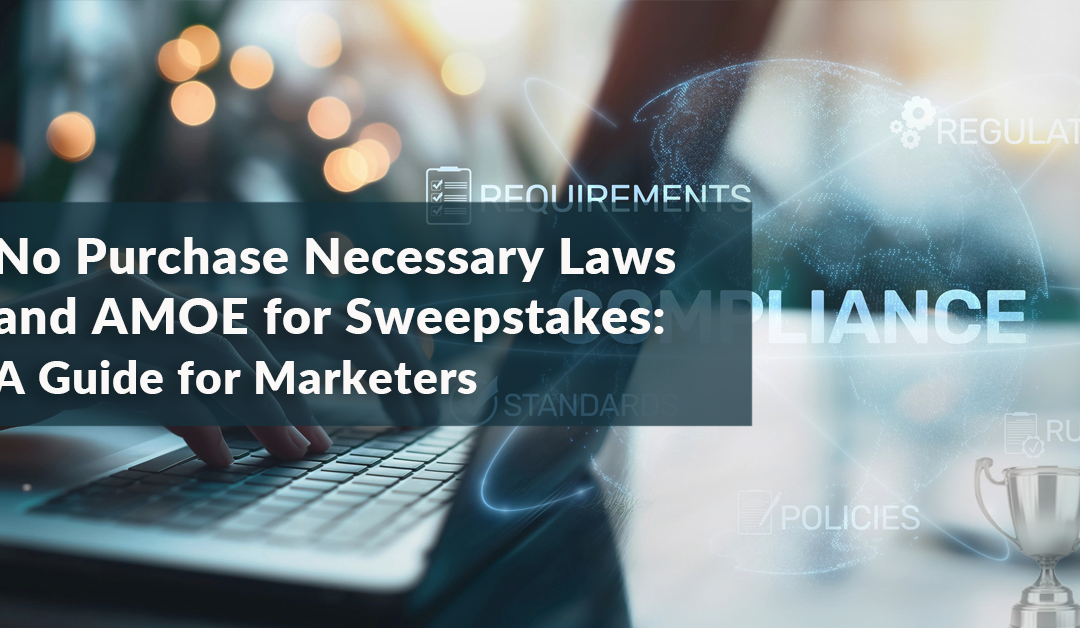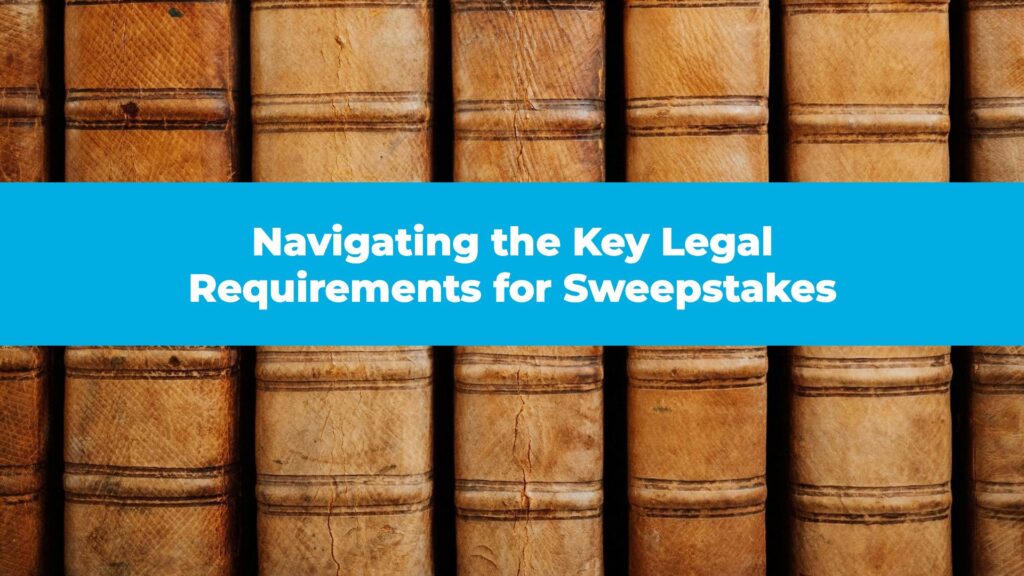Promotional sweepstakes offer exciting opportunities for businesses and participants alike, but their legal framework remains one of the most misunderstood aspects of marketing campaigns. Originating as product-linked lotteries in the early 20th century, these contests have evolved into sophisticated tools governed by a patchwork of federal and state regulations. Today, the Federal Communications Commission (FCC) and Federal Trade Commission (FTC) enforce strict guidelines to prevent illegal gambling disguised as promotions.
Understanding jurisdictional differences is critical for compliance. While federal laws establish baseline rules, individual states often impose additional requirements. For example, registration thresholds, prize disclosure rules, and entry methods can vary dramatically across borders. Sponsors must tailor campaigns to meet location-specific standards to ensure validity.
Failure to adhere to these regulations risks disqualifying entries or triggering legal action. Marketing professionals and legal teams must collaborate closely to navigate this dynamic landscape. Historical precedents, like anti-lottery statutes, continue to shape modern interpretations of what constitutes a lawful promotion.
Key Takeaways
- Sweepstakes legality depends on both federal standards and state-specific rules
- The FCC and FTC actively enforce anti-gambling provisions in promotions
- Modern regulations stem from historical lottery restrictions
- Prize structures and entry methods require careful compliance checks
- Multi-state campaigns demand localized legal reviews
Understanding Sweepstakes Laws in the United States
Running promotional giveaways requires navigating a dual-layer legal system. Federal and state regulations work together to prevent fraud while allowing businesses to engage customers. This system balances consumer protection with marketing flexibility.
Key Regulatory Bodies and Federal Oversight
The Federal Trade Commission (FTC) acts as the primary watchdog for promotional rules. It enforces truth-in-advertising standards and investigates deceptive practices. Alongside the FTC, the Federal Communications Commission (FCC) monitors radio, TV, and internet-based promotions.
- Prohibiting hidden costs or purchase requirements
- Mandating clear prize descriptions
- Ensuring equal entry opportunities
Federal vs. State Legal Frameworks
Federal laws set minimum standards, but states add extra layers. For example, New York requires sponsors to file $5,000+ prize details, while Florida bans alcohol-related promotions. This creates a compliance puzzle for multi-state campaigns.
| Aspect | Federal Focus | State Focus |
|---|---|---|
| Registration | None | Required in 5 states for large prizes |
| Entry Methods | Free alternatives mandatory | Additional restrictions in 8 states |
| Prize Taxes | IRS reporting | Local tax rules apply |
Sponsors must review both levels of requirements before launching. Legal teams often use checklists to address location-specific rules efficiently.
Why Some Sweepstakes Are Void in Certain States
Legal landscapes differ significantly across the U.S., creating pockets where promotional campaigns face automatic disqualification. These limitations often stem from strict gambling definitions that classify free-entry giveaways as lotteries if they meet specific criteria. State legislatures maintain unique thresholds for what constitutes illegal gambling, with some regions requiring absolute "no purchase necessary" clauses to avoid legal challenges.
- Overlap with existing anti-lottery statutes
- Heightened consumer protection measures
- Conflicts with alcohol/tobacco promotion bans
Regions like Florida and New York frequently appear in void clauses due to their historical stance on gaming regulations. Marketing teams must review local statutes governing prize values, entry methods, and winner notifications. Campaigns omitting prohibited territories risk fines or forced shutdowns.
Best practices include:
- Consulting state gaming commissions during planning
- Embedding clear jurisdiction exclusions in official rules
- Updating exclusion lists biannually
Recent cases show regulators increasingly scrutinizing digital entry methods across borders. Sponsors using social media platforms should implement geo-targeting tools to block restricted areas automatically.
The Evolution of Sweepstakes: History and Legal Background
Modern promotional campaigns owe their structure to early 20th-century marketing innovations. Businesses initially attached prize drawings directly to product purchases, creating what courts later deemed "consideration" – a key element of illegal lotteries. This approach sparked legal battles that reshaped promotional laws nationwide.
Origins and the Lottery Connection
Early giveaways required buying goods for entry, mirroring lottery mechanics. Landmark court rulings established that any exchange of value (money or effort) created gambling scenarios. By the 1930s, regulators demanded free entry methods to separate legal contests from prohibited games of chance.
Developments by the FCC and FTC
Broadcast media's rise forced clearer guidelines. The FCC banned paid-entry promotions on airwaves in 1954, cementing "no purchase necessary" rules. Simultaneously, the FTC targeted deceptive practices through truth-in-advertising standards. These agencies transformed product-linked drawings into today's compliant sweepstakes models.
Three critical shifts emerged:
- Mandatory free entry alternatives
- Explicit prize odds disclosure
- Elimination of skill-testing questions
Modern sponsors maintain strict separation between purchases and entries to avoid gambling classifications. This historical foundation explains why regulations prioritize transparency and equal participation in all promotional contests.
Compliance Essentials for Sweepstakes Contest Sponsors
Creating legally sound promotions demands meticulous attention to regulatory checklists and documentation standards. Sponsors must craft official rules that address both federal mandates and regional variations. Missing even one required element could invalidate entries or expose businesses to penalties.
Mandatory Official Rules and Disclosures
Every sweepstakes contest requires comprehensive rules containing 12 critical components. These requirements ensure participants understand entry mechanics while protecting sponsors from legal challenges.
| Rule Element | Purpose | Example |
|---|---|---|
| No Purchase Clause | Prevents gambling classification | "Mail-in entries accepted without payment" |
| Prize Details | Ensures transparency | "$5,000 retail value (exact model specified)" |
| Void Locations | Complies with regional bans | "Excludes Rhode Island residents" |
No Purchase Necessary Guidelines
Federal rules mandate free entry methods to separate promotions from illegal lotteries. Sponsors must provide equally convenient alternatives to paid options, like:
- Online forms without checkout steps
- Postcard submissions with handwritten requests
- QR code access at physical locations
All disclosures about free entry methods must appear in promotional materials and official rules. Marketing teams should test entry processes to confirm compliance across platforms.
State-by-State Overview: Sweepstakes Laws Across the U.S.
Navigating U.S. sweepstakes regulations requires understanding key regional variations that impact promotional campaigns. While text-to-win promotions remain legal nationwide, compliance hurdles emerge when crossing state lines.
Highlighting Notable Differences by Region
Three states demonstrate how local laws create unique compliance challenges:
- Florida mandates 7-day advance registration for prizes exceeding $5,000
- New York extends bonding requirements to 30 days pre-launch
- Arizona forces registration for skill-based contests linked to purchases
Alcohol and tobacco promotions face extra scrutiny. Seven states require pre-approval for liquor-related giveaways, while four prohibit nicotine product prizes entirely. Marketing teams must adjust timelines for state-specific reporting rules like Arizona's 10-day winner list submission.
| State | Key Requirement | Deadline |
|---|---|---|
| Florida | Prize bonding | 7 days pre-launch |
| New York | High-value registration | 30 days pre-launch |
| Arizona | Contest registration | Pre-promotion |
Successful sponsors create regional compliance checklists addressing bonding timelines, prohibited industries, and reporting formats. Regular audits help maintain alignment with evolving regulations in target markets.
Understanding Eligibility and Entry Requirements
Clear eligibility standards form the backbone of legally compliant promotions. Sponsors must define participation criteria upfront to avoid disputes and ensure fair access. Three core factors determine qualification: age, location, and entry mechanics.

Age, Residence, and Skill Considerations
Most promotions require participants to be at least 18 years old. Some states impose higher age limits for alcohol-related giveaways or cash prizes. Residency restrictions often exclude:
- Florida residents from vehicle-based contests
- New York participants in tobacco promotions
- Rhode Island entries for certain prize values
Skill-based elements create additional layers. Contests requiring artistic submissions or problem-solving tasks must avoid subjective judging criteria. Clear rubrics help maintain compliance with anti-discrimination laws.
Clear Entry Methods and Disclosure Requirements
Every promotion must offer free entry alternatives matching paid options in convenience. Text-to-enter systems require specific warnings:
"Text message and data rates may apply"
| Entry Type | Requirements | Example |
|---|---|---|
| Online Form | No purchase checkbox | Separate submission portal |
| Text Message | Rate disclosure | Short code with opt-out instructions |
| Mail-In | Handwritten requests | Postcard size restrictions |
Marketing consent language must appear before submission buttons. Phrases like "By entering, you agree to receive promotional emails" help meet telecommunication regulations while building subscriber lists.
Void Jurisdictions and Sweepstakes Restrictions
Marketing campaigns face unique compliance hurdles when prizes cross state lines. Geographic limitations often emerge from conflicting definitions of gambling activities. Three states demonstrate how localized restrictions create operational challenges for national promotions.
Identifying States with Void Sweepstakes
Michigan and Ohio prohibit promotions requiring physical store visits for entry. Distributing paper forms exclusively at retail locations violates their anti-consideration laws. Rhode Island mandates registration for retail businesses offering prizes exceeding $500 value.
| State | Restriction Type | Compliance Action |
|---|---|---|
| Michigan | Store entry prohibition | Online alternatives required |
| Ohio | In-person form ban | Digital submission options |
| Rhode Island | Registration mandate | State filings for $500+ prizes |
Implications for Contest Organizers
Ignoring regional rules risks fines up to $25,000 per violation in regulated states. Enforcement agencies may:
- Invalidate all entries from restricted areas
- Require prize redistribution
- Issue cease-and-desist orders
Smart organizers use IP filtering and mobile geolocation to block prohibited regions. Legal teams should review exclusion lists quarterly, particularly before holiday promotions. Recent updates in Florida's bonding requirements show how quickly regulations can change.
Proactive compliance protects brand reputation and ensures valid winner selection. Always cross-reference state gaming commission databases when planning multi-region contests.
The Role of Consideration in Sweepstakes vs. Contests
Legal distinctions between promotional formats hinge on one critical factor: consideration. This legal concept determines whether an activity qualifies as a lawful contest or risks classification as an illegal lottery. Understanding this difference helps businesses design compliant campaigns.
Monetary Versus Non-Monetary Considerations
Monetary consideration involves exchanging value for entry, like product purchases or entry fees. Courts view these transactions as creating gambling scenarios when combined with chance-based outcomes. For example:
- Buying coffee to enter a prize draw
- Paying $5 for contest submission
Non-monetary consideration includes significant time investments or complex tasks. Requiring social media shares or lengthy video submissions may trigger legal scrutiny. Regulators assess whether effort creates unfair barriers to entry.
| Element | Sweepstakes | Contest |
|---|---|---|
| Prize | Required | Required |
| Chance | Determines winner | Limited role |
| Consideration | Prohibited | Required |
To maintain compliance:
- Offer free mail-in alternatives matching paid options
- Limit required tasks to under 2 minutes
- Separate purchase flows from entry mechanisms
Legal Implications of Prize Disclosures and Odds
Transparent communication forms the foundation of legally sound promotions. Federal mandates require sponsors to disclose specific details about prizes and winning probabilities. Missing these requirements can invalidate entries or trigger regulatory penalties.
Ensuring Transparent Prize Information
Every promotion must clearly state the prize value using exact figures or approved calculation methods. For example:
- "$2,500 cash equivalent" for travel vouchers
- "Manufacturer's suggested retail price" for products
Sponsors should include substitution clauses allowing equivalent replacements if original prizes become unavailable. These policies protect businesses while maintaining participant trust.
Accurate Odds and Registration Requirements
Calculating winning probabilities requires analyzing expected entries versus available prizes. A campaign offering 10 gift cards with 50,000 anticipated participants must state:
"Odds of winning: 1 in 5,000"
| Disclosure Element | Federal Rule | State Additions |
|---|---|---|
| Prize Description | Mandatory | Extra specs in 9 states |
| Winner List Access | Optional | Required in NY/FL |
| Odds Statement | Required | Format rules in 3 states |
Florida and New York demand public access to winner lists for 30-60 days post-promotion. Digital platforms simplify compliance through automated reporting systems. Regular audits help maintain accuracy across multiple campaigns.
Best Practices for Running Legally Compliant Promotions
Successful promotional campaigns balance creativity with regulatory precision. Sponsors must prioritize risk mitigation through strategic planning and precise execution. Three elements form the compliance trifecta: airtight documentation, verifiable processes, and adaptable frameworks.
Developing Comprehensive Official Rules
Official rules serve as the campaign's legal backbone. Include no-purchase alternatives, eligibility criteria, and void jurisdictions. Specify exact prize details and tax responsibilities. Always include:
- Entry deadline in multiple time zones
- Alternative submission methods for disabled participants
- State-specific bonding requirements
Accurate Winner Selection and Notification Processes
Use third-party software or auditors for impartial results. Document every step from random draws to verification calls. Send confirmation emails with clear redemption deadlines and IRS forms. Maintain records for three years post-campaign.
Implement geo-tagged timestamps for digital entries to resolve disputes. Update exclusion lists quarterly to reflect new regulations. Transparency in winner announcements builds trust while reducing legal exposure.

